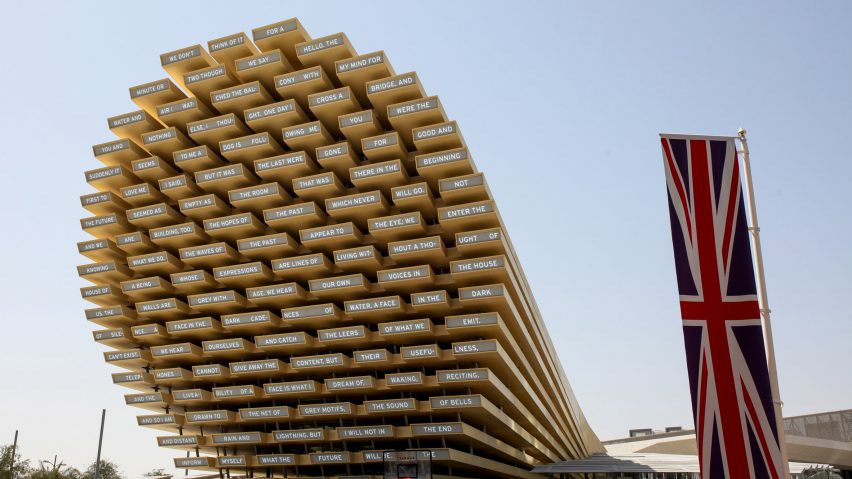
"There's room for both Dyson and Downton when presenting the best of British"
It is time to rethink how the UK presents itself to the world at global events like Expo 2020 Dubai, writes Paul Thompson.
For the past six months, Es Devlin's AI-poem pavilion has been the face of the UK at the Dubai world expo. With the expo closing last week, after 23 million visitors came to the site, it is time to reassess the way the UK presents itself on the global stage.
Is the UK Pavilion – rooted in AI, machine learning interlaced with human interactions – what the world expected from us? Does the world think of the late Stephen Hawking when it thinks of the UK?
For the past decade at least, the UK has wrestled with this dialectic: the world sees Beefeaters, the changing of the guard, and London. While the design and architectural community passionately persuades the civil servants to present another version of England and the devolved nations.
The world is quite fixed in its vision of how it wants to see the UK
This can be seen by our efforts at previous expos. In 2015, Wolfgang Buttress' UK pavilion presented the world with a beehive and a provocation on food security and biodiversity.
From Heatherwick in 2010 we saw a "cathedral to seeds" as a way to highlight cities' relationship to nature, and perhaps nod to our heritage in Kew and the newly opened Sainsbury Centre for Biological Sciences at Cambridge in its magnificent Stanton Williams building.
Despite these efforts, it seems as if the world is quite fixed in its vision of how it wants to see the UK. Downton Abbey, the Beatles and Paddington Bear.
The Union Jack flags that now bedeck the exterior were a late addition to the expo site, requested by visitors. Feedback suggested the world wanted and expected to see Paddington Bear and Downton Abbey.
I believe a subtle pivot can be made which fulfills both parties' needs
This is backed up by a British Council report on Soft Power from 2019 which argued that "the UK today is recognised more for its past than for its present, with potentially worrying implications for its future". This is indeed a potentially worrying implication – and one which we have to continue subtly to reflect and then refract, rather than overtly block.
If the world wants to see its perceptions of the UK confirmed, then I believe a subtle pivot can be made which fulfills both parties' needs. Yes, the UK has costume drama – and the Downton Abbeys can be presented not only in-and-of themselves, but as examples of a powerful creative industry of film and TV production which is peculiarly British and in which we really are world-leading.
Our ability to tell stories – either fictional or documentary – relies upon great British companies like Framestore and Atlantic Productions creating breathtaking special effects for filmmakers around the world in futuristic, naturalistic, or historic settings.
Our literary heritage of course is ever-present in Shakespeare and Wordsworth, and we continue to tell stories by Lucy Kirkwood – and yes, Julian Fellowes! – that clearly captivate on screen, with directors such as Steve McQueen and Asif Kapadia. And we win Oscars for our direction, acting and production of these films.
We need to work with and subtly subvert the stereotypes
All are proof points of Britain's creative and "createch" industries have mass-market appeal and can be touched and felt by consumers around the world. More examples are a Dyson hand dryer, the luxury of an Aston Martin, a Range Rover or a Philip Treacy hat.
We need to work with and subtly subvert the stereotypes, by revealing the skills and talents that lie beneath these creations and tell the world – and indeed ourselves – that the creative industries in the UK are valued at £112 Billion GVA and are growing faster than our financial services industries.
Why after all is the Swedish electric vehicle maker Polestar choosing to base its R&D and design centre in the West Midlands? Why is Netflix building vast production facilities in the UK? Why do world-leading architects like David Adjaye remain in the UK?
We need the Beefeaters to present constancy and predictability
In the final month of Expo 2020, the Royal College of Art took up a two-day residence in the UK Pavilion projecting Britain's position as global leader in design, innovation, research and education.
We were proud to showcase a perspective of Britain, which is highly international, innovative and contributing to global progress through creativity, technology and engineering.
In terms of Britain's image on the world stage, we need the Beefeaters to present constancy and predictability, and not to stand aside, but allow room for the British creative tech that startles and amazes. There's room for both Dyson and Downton when presenting the best of British.
Paul Thompson is vice-chancellor of the Royal College of Art in London. he was previously director of the Smithsonian's Cooper-Hewitt National Design Museum in New York and director of the Design Museum in London.